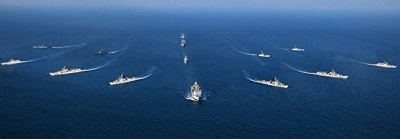Context
The commissioning of the Mauritian Naval Ship Barracuda in 2015 marked a significant moment for India's maritime diplomacy, as Prime Minister articulated a vision for the Indian Ocean region encapsulated in the acronym SAGAR - Security and Growth for All in the Region. This vision, aligned with the Indian Maritime Strategy of 2015, emphasized the importance of fostering cooperation and addressing challenges through collaborative maritime engagements. Over the past decade, the Indian Navy has actively pursued this vision, bolstering its role as a preferred security partner and first responder in the region.
|
About SAGAR
Based on this vision of the SAGAR initiative can be defined under the following terms:
|
Building Bridges of Friendship through High-level Maritime Strategic Interactions
Events like the International Fleet Review (IFR) in 2016 and the multinational exercise 'Milan' have served as platforms for fostering international maritime cooperation. The participation of numerous navies in these events underscores India's role in nurturing peace and tranquility in the Indian Ocean. Additionally, initiatives like the Information Fusion Centre - Indian Ocean Region (IFC-IOR) have furthered maritime safety and security by facilitating information sharing among maritime agencies and countries. Such strategic interactions have reinforced India's position as a key player in shaping the maritime environment.
Capacity and Capability Building - India, a Preferred Security Partner
India has actively contributed to capacity building among smaller navies through training programs and the transfer of naval assets. By offering training infrastructure and sharing expertise, India has enhanced interoperability and cooperation with neighboring navies. The transfer of ships, aircraft, and other assets to countries in the region has strengthened maritime capabilities and fostered closer ties. These efforts exemplify India's commitment to being a reliable security partner in the Indian Ocean.
Operational Deployments
The Indian Navy's operational deployments in the Indian Ocean have been organized under the Mission Based Deployment concept since 2017. This proactive approach has enabled the Navy to respond swiftly to emerging threats, including piracy and smuggling. Notably, the Navy's efforts in escorting cargo and conducting boarding operations have contributed to maintaining maritime security in the region. Through its presence and surveillance missions, the Indian Navy continues to safeguard vital sea lanes and ensure stability in the Indian Ocean.
Being the First Responder to a Crisis
India's willingness to provide maritime assistance during crises highlights its commitment to regional stability and humanitarian principles. From disaster relief operations to evacuating stranded citizens, the Indian Navy has played a pivotal role in alleviating crises in the Indian Ocean region. Notably, during the COVID-19 pandemic, the Navy deployed ships to provide assistance to several countries, demonstrating its readiness to support neighboring states during times of need.
Conclusion
In conclusion, India's maritime diplomacy over the past decade has contributed significantly to shaping the security landscape of the Indian Ocean region. Through strategic interactions, capacity building initiatives, operational deployments, and crisis response efforts, India has emerged as a responsible and capable maritime power. As the Indian Navy continues to prioritize regional cooperation and security, it is poised to play a pivotal role in promoting peace and prosperity in the Indian Ocean.
|
Probable Questions for UPSC Mains Exam
|
Source - The Indian Express







